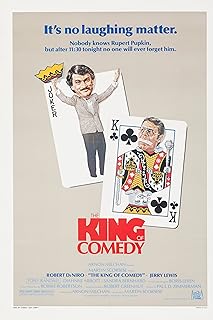電影訊息
喜劇之王 [美]--The King of Comedy
編劇: Paul D. Zimmerman
演員: 勞勃狄尼洛 傑瑞路易 Diahnne Abbott Sandra Bernhard 雪麗海克
喜剧之王/喜剧之王
導演: 馬丁史柯西斯編劇: Paul D. Zimmerman
演員: 勞勃狄尼洛 傑瑞路易 Diahnne Abbott Sandra Bernhard 雪麗海克
電影評論更多影評

2012-11-28 19:48:05
KOC BACKGROUND
Critical History:
Rotten Tomatoes reported that 93% of 40 critics gave the film positive reviews. Its critical consensus states: "Largely misunderstood upon its release, The King of Comedy today looks eerily prescient, and features a fine performance by Robert DeNiro as a strangely sympathetic psychopath."
Timeout called it 'Creepiest movie of the year in every sense, and one of the best.'
Roger Ebert of the 芝加哥 Sun-Times gave the film three out of four stars, writing, "The King of Comedy is one of the most arid, painful, wounded movies I've ever seen."
Dave Kehr of the 芝加哥 Reader gave the film a favorable review, calling the film, "clearly an extension of Taxi Driver and the "uncenteredness of the film is irritating."
Not all critics gave the film positive reviews, however; Adam 史密斯 of Empire Magazine called it "Neither funny enough to be an effective black comedy nor scary enough to capitalize on its thriller/horror elements". Pauline Kael of The 紐約er described the character of Rupert Pupkin as "Jake LaMotta without fists."
Director's Characteristics:
The King of Comedy was an obvious departure from the more emotionally committed films Scorsese had become associated with. Visually, it was far less kinetic than the style Scorsese had developed up until this point, often using a static camera and long takes. The expressionism of his recent work here gave way to moments of almost total surrealism. It still bore many of Scorsese's trademarks, however, such as its focus on a troubled loner who ironically becomes famous through a criminal act- murder and kidnapping, respectively.
Critic's lists:
Halliwells Top 1000 #180
1001 Movies You Must See Before you Die
Jonathan Rosenbaum: 1000 Essential Films
The 紐約 Times Guide to the Best 1,000 Movies Ever Made[16]
Total Film Presents The 100 Greatest Movies Of All Time #85
Empire's list of 500 greatest films (no. 87)
Production History:
After Raging Bull was completed, Scorsese was keen to do The Last Temptation of Christ, and wanted De Niro to play Jesus Christ. De Niro was not interested and preferred their next collaboration to be a comedy. De Niro brought the script by Paul D. Zimmerman to Scorsese in 1974, two years before Taxi Driver, but Scorsese remained unconvinced until he looked at it again in the early eighties. But Scorsese pondered whether he could face shooting another film, particularly with a looming strike by the Writers Guild of America. Producer Arnon Milchan knew he could do the project away from Hollywood interference by filming entirely on location in 紐約 and deliver it on time with the involvement of a smaller film company. Together they brought it to 傑瑞 Lewis with a view to him playing Langford, and he got it immediately (Lewis brought many insights from his crazy long career. The scene where he is rebuked by an elderly lady, said "you should only get cancer」 was directed by him from his own experience).
Socio-political texts and subtexts
Historical Context: After Raging Bull been widely viewed as a masterpiece and received eight Oscar nominations, The King of Comedy is Scorsese's fifth collaboration with Robert De Niro. It failed at the box office, but has become increasingly well regarded by critics in the years since its release. German director Wim Wenders numbered it among his fifteen favorite films.
media: Scorsese once again blunders [???] his ironic ending like he does with Taxi Driver. Despite Rupert's incarceration his fame continues, with magazine covers, a bestselling memoir and, upon his release, a sellout stand up show.
family: Rupert's mom- who was played by Scorsese's mother- never appears on screen.
friends: Rupert has a weird dysfunctional relationship with Masha, a fellow stalker at the doors of 傑瑞's studio who is even more completely bonkers than Rupert. Even with her, Rupert can』t be honest, not admitting he lives with his mother.
Other nationalities: Chinese butler with antipathetic accent and makes innocuous jokes.
Ideology: no particular ideology being mentioned—THEREFORE, BY DEFINITION, CAPITALIST.
Politics
Neo-Fascism (?): "The triumph of the "little guy" is revealed to be nothing more than lumpen neo-Fascist blood lust." (http://ehrensteinland.com/htmls/library/koc.html) But this I don't understand.
Communication: Rupert constantly refuses to receive messages from others. So does 傑瑞, who refuses people enter his car/office/country estate, i.e. he fends off Masha’s intrusive phone call with a weary, guarded, 「How did you get this number?」
Alienation: "Wannabes" are alienated from the world of fame. Played with an icily polite veneer by Shelley Hack, the production executive dismisses Rupert with thinly veiled contempt. You』re either a part of her world or you』re not. While there’s no mistaking that Rupert belongs firmly to the category of weirdo wannabes and hence, does not merit her attention.
傑瑞 as a public real life star is also the brittle, lonely man behind the facade. He sits in his glass screened apartment, reflects himself back many times, watches a 1953 black&white film which is a famous master-piece but also being alienated from the colorful contemporary world.
Sources:
http://www.tcm.com/tcmdb/title/21359/The-King-Of-Comedy/full-credits.html
http://www.rottentomatoes.com/m/1011623-king_of_comedy/
http://en.wikipedia.org/wiki/The_King_of_Comedy_(1983_film)
http://en.wikipedia.org/wiki/馬丁_Scorsese
評論

